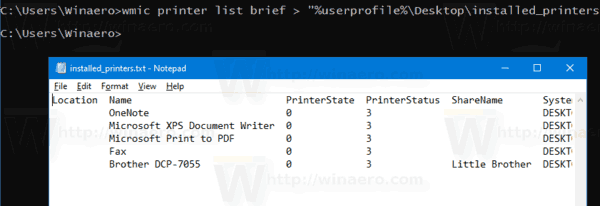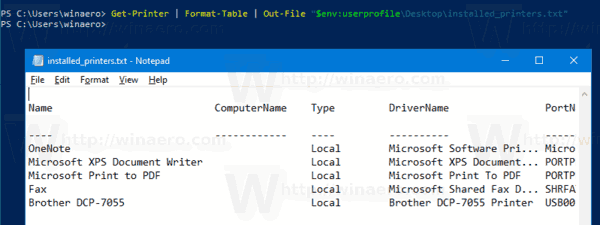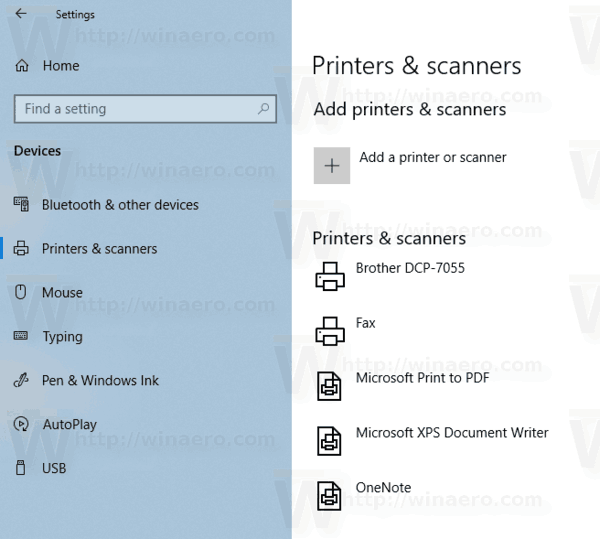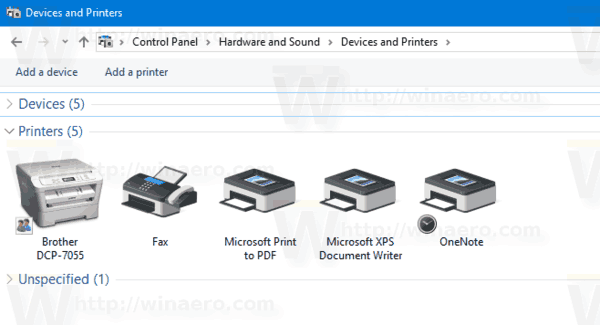In Windows 10, it is possible to create a list of all installed printers, and save it to a file. There are a number of methods you can use. Let's review them.
Advertisеment
In Windows 10, you can manage the printer queue using Devices and Printers in the classic Control Panel app or in Settings->Devices->Printers and Scanners. However, these tools do not allow creating a list of installed printers.
Note: Windows 10 Doesn’t Include Printer Drivers Any More
To create such a list, we can use the built-in tools, wmic and PowerShell.
WMIC stands for 'WMI command-line'. This tool provides a command-line interface for WMI. WMI has been an important part of Microsoft's systems management initiative since Microsoft Systems Management Server (SMS) 2.0 and has grown in popularity since the introduction of Windows 2000. WMIC extends WMI for operation from several command-line interfaces and through batch scripts. WMIC is compatible with existing shells and utility commands.
To List Installed Printers in Windows 10,
- Open a new command prompt
- Type the following command:
wmic printer list brief. This will show the list of installed printers.
- To save the list to a file, issue the command
wmic printer list brief > "%userprofile%\Desktop\installed_printers.txt". This will create a new file, installed_printers.txt, on your Desktop. It will contain the list of all installed printers.
You are done.
Alternatively, you can use PowerShell for the same purpose.
PowerShell is an advanced form of command prompt. It is extended with a huge set of ready-to-use cmdlets and comes with the ability to use .NET framework/C# in various scenarios. Windows includes a GUI tool, PowerShell ISE, which allows editing and debugging scripts in a useful way.
To List Installed Printers in Windows 10 with PowerShell,
- Open PowerShell. Tip: You can add "Open PowerShell As Administrator" context menu.
- Type or copy-paste the following command to list your installed printers:
Get-Printer | Format-Table

- To save the list to a file, execute the command:
Get-Printer | Format-Table | Out-File "$env:userprofile\Desktop\installed_printers.txt"

- The file installed_printers.txt on your Desktop will contain information about your printers.
You are done!
Finally, you can find the list of your installed printers in Settings > Devices -> Printers & scanners: 
And also in the classic Control Panel under Control Panel\Hardware and Sound\Devices and Printers.
Related articles:
- Remove Printer in Windows 10
- Rename Printer in Windows 10
- Add Shared Printer in Windows 10
- How to Share a Printer in Windows 10
- Backup and Restore Printers in Windows 10
- Open Printer Queue With a Shortcut in Windows 10
- Set Default Printer in Windows 10
- How to stop Windows 10 from changing the default printer
- Open Printer Queue in Windows 10
- Create Printers Folder Shortcut in Windows 10
- Clear Stuck Jobs from Printer Queue in Windows 10
- Create Devices and Printers Shortcut in Windows 10
- Add Devices and Printers Context Menu in Windows 10
- Add Devices and Printers To This PC in Windows 10
Support us
Winaero greatly relies on your support. You can help the site keep bringing you interesting and useful content and software by using these options:

There is another window to show all the installed printers (only with Windows Pro) :
%systemroot%\system32\printmanagement.msc
Within this window, you can see all the printers (even the printers who disappear in the traditional “Devices and printers” window. You can select them all or some of them and delete them in bulk. Export of the list is easy with the Action button at the left.
I have upgraded all my PC’s to Windows 10 Pro to have this option enabled, since so many of my printers disappeared from the classic window.
Thank you very much. Completely forgot about this snap-in.
Question: I created the wmic to export my printers
wmic printer get name,servername,SystemName,ShareName,PortName,network,local >%userprofile%\documents\Printers.txt
how can I run the exported text file to import the list on a another system